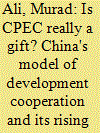| Srl | Item |
| 1 |
ID:
139802


|
|
|
|
|
| Summary/Abstract |
Donor proliferation and the fragmentation of aid delivery is an important problem besetting foreign aid policy. Increased donor coordination is widely seen as a fix to this problem. This article explores theoretically and empirically the collective action problems and incentives that donors face when coordinating their actions, based on the distinction between private and public goods properties of aid. I introduce the concept of lead donorship, develop a measure that accounts for the exclusive and long-lasting ties between a lead donor and a recipient country, and show that lead donorship is in long-term decline. I test my theory combining spatial autoregressive (SAR) models, nonparametric model discrimination techniques, and data on aid delivery channels. I recover evidence of collusion in the provision of private goods aid in the presence of a lead donor, and lack of coordination and competition in the absence of a lead donor.
|
|
|
|
|
|
|
|
|
|
|
|
|
|
|
|
| 2 |
ID:
162768


|
|
|
|
|
| Summary/Abstract |
How do domestic politics in the donor country affect foreign aid policy? Scholars have analyzed the impact that political parties and domestic institutions play in shaping aid effort. Building on this previous work, we examine the impact of domestic politics on the channels chosen for aid distribution. In this paper, we explore whether and how the ideological composition of donor governments affects the method of delivering aid to recipient states. Specifically, we argue that more liberal governments are more inclined to provide aid via nongovernmental organizations (NGOs), while more conservative governments prefer to give aid through direct bilateral government-to-government channels. These choices, we argue, reflect the different goals that right and left parties pursue through their allocation of foreign aid. Our results indicate that left governments are more inclined to channel aid through NGOs in an attempt to directly implement poverty alleviation strategies. Alternatively, right wing governments place a greater emphasis on channeling aid through recipient state governments to promote the economic interests of their constituents and the geopolitical interests of the state.
|
|
|
|
|
|
|
|
|
|
|
|
|
|
|
|
| 3 |
ID:
164107


|
|
|